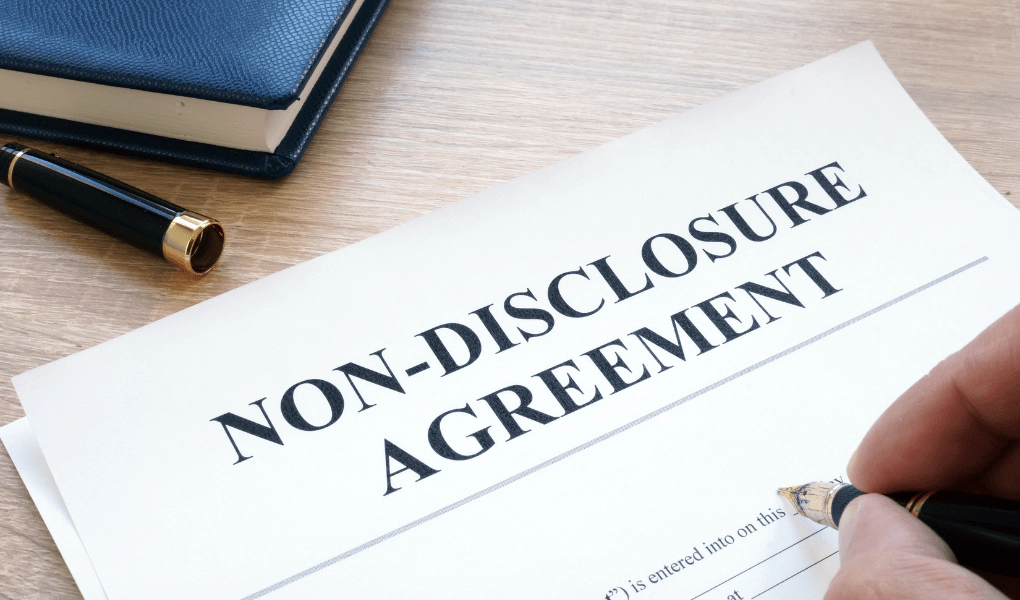
Operating a travel booking platform: simple intermediary or travel agency?
You own or develop an online platform for travel services that can be booked by tourists, and you have at least once …

Signing an NDA is sometimes critical, aimed at protecting shared confidential information and preventing unauthorised disclosure.
In this article, we will discuss what NDAs are, when you should sign one, and what you should keep in mind when signing an NDA.
NDA stands for “Non-disclosure agreement”.
Briefly, NDAs are agreements that help you protect confidential information about your product or business. These agreements prohibit the person receiving the information from disclosing or using it in any way other than as set out in the NDA.
NDA can cover both situations where only one party gives confidential information to the other (a so-called unilateral agreement) and situations where each party gives confidential information in turn (a so-called bilateral agreement). The distinction is relevant in terms of obligations and liability - in the first case, the NDA obliges only one party to maintain the confidentiality (and that party also undertakes the eventual liability), and in the second case, the NDA obliges both parties to maintain the information confidentiality.
An NDA should expressly state what information is considered confidential, so that it is clear to each party which information they are not allowed to disclose or use without permission.
The law does not provide a clear definition of confidential information, but this should be determined on a case-by-case basis, based on the specific contractual/business relationship.
Usually, any information concerning the party and the activity of the disclosing party, such as trade secrets, know-how, financial or business partner information, information which if known would be an advantage to competitors, plans or techniques for selling and marketing intellectual property rights, and any other such information which may be deemed confidential, as appropriate, may be considered confidential.
Therefore, if you are the party transmitting the information, you ensure that the other party knows exactly what to keep confidential.
At the same time, if you are the party receiving the information, you make sure you know from the beginning what is confidential and what is not.
In addition to establishing the confidentiality of the information, it is also important to clarify what the receiving party is allowed to do with it. Especially if you are the one transmitting the information.
For example, in the case of concluding an NDA in the pre-contractual stage of the provision of services (e.g., quotation stage), you should clarify that the confidential information can be used strictly for the establishment of the services and the quotation.
We should distinguish between an NDA and the confidentiality clause included in an agreement. The results are similar, but in the first case (NDA) we are talking about a separate agreement (which only regulates the confidentiality of information), and in the second case, we are talking about an agreement with a distinct object (for example, the provision of services), in which you also include a confidentiality clause / section.
The NDA is useful (i) if you have not signed an agreement, (ii) if you do not already have a clause in the agreement, or (iii) if, although you have a specific confidentiality clause in a signed agreement, you want to better regulate the protection of the information.
Here are some practical examples where you should sign an NDA:
*As for signing an NDA in the context of an investment, sometimes entrepreneurs tend to sign such an agreement with potential investors to ensure confidentiality of information about their product, including trade secrets or development strategies. However, signing an NDA with potential investors should be considered on a case-by-case basis, to avoid a situation where your proposal to sign an NDA may affect the relationship between you and potential investors. An alternative to signing an NDA with investors would be to provide as little confidential information as possible until you sign the term sheet (which usually includes confidentiality clauses).
There is no specific time limit laid down in the legislation, so it should be determined on a case-by-case basis, taking into account the particularities of each situation.
However, in order to avoid any possible future discussions on this issue, the duration of the confidentiality obligation should be expressly stated in the NDA.
Apart from setting out the confidential information and the duration of the confidentiality obligation, it is also essential to pay attention to the following clauses:
Liability for breach of confidentiality is one of the most important aspects in an NDA – such clause setting out the consequences of breaching the agreement.
There are several options to establish liability - you can limit it, aggravate it or you can have it determined by the court.
A quite common solution in practice is to establish from the beginning that breach of the confidentiality obligation will result in the defaulting party being obliged to pay you a certain amount of money (damages), the amount of which you can expressly state in the agreement (e.g., EUR 1,000 or even much higher damages);
If you are transmitting the information, it is best for you to set an amount as high as possible to discourage the co-contractor from breaching this obligation.
If you are receiving the information, the best option is to set an amount as small as possible (to limit the consequences of a potential breach).
If both parties are transmitting information, you should think of an amount that discourages the other party but is not too onerous for you.
Although we could say that non-compete and confidentiality are connected, they remain essentially two different issues - on the one hand, non-compete means that the other party will not be able to carry out, in its own interest or in the interest of a third party, activities that compete with your activity and, on the other hand, confidentiality concerns non-disclosure of confidential information.
Therefore, in some cases, you may consider including a specific non-compete clause.
If you want to know what your risks are in an NDA or if you need an NDA, we work closely with you to address your need.

You own or develop an online platform for travel services that can be booked by tourists, and you have at least once …

Developing a software product is a complex process that involves much more than coding and design. It is important not …